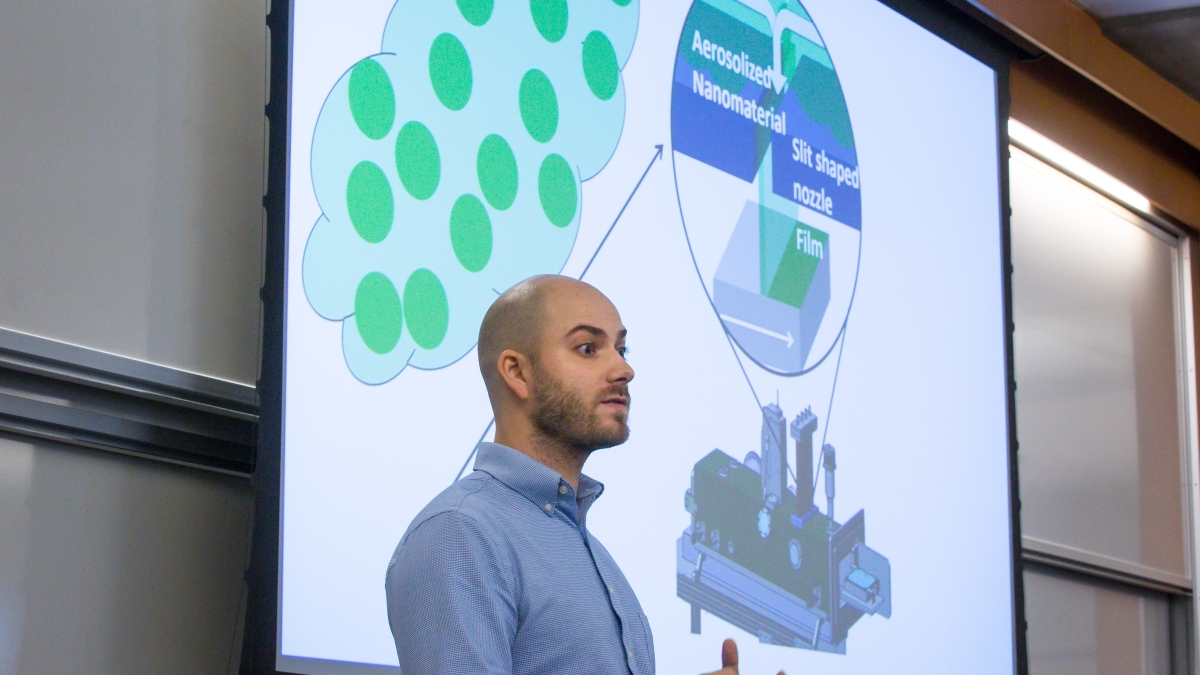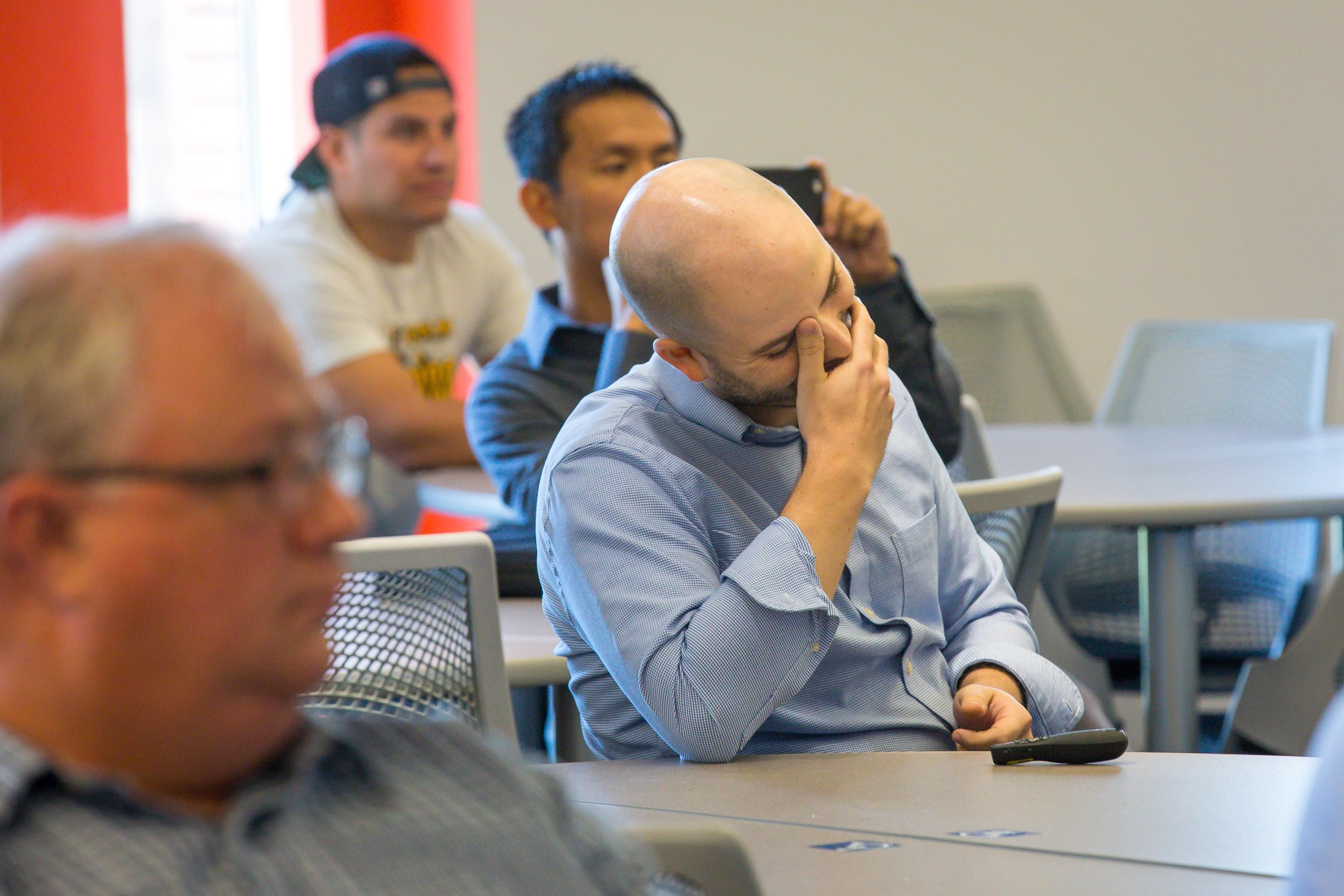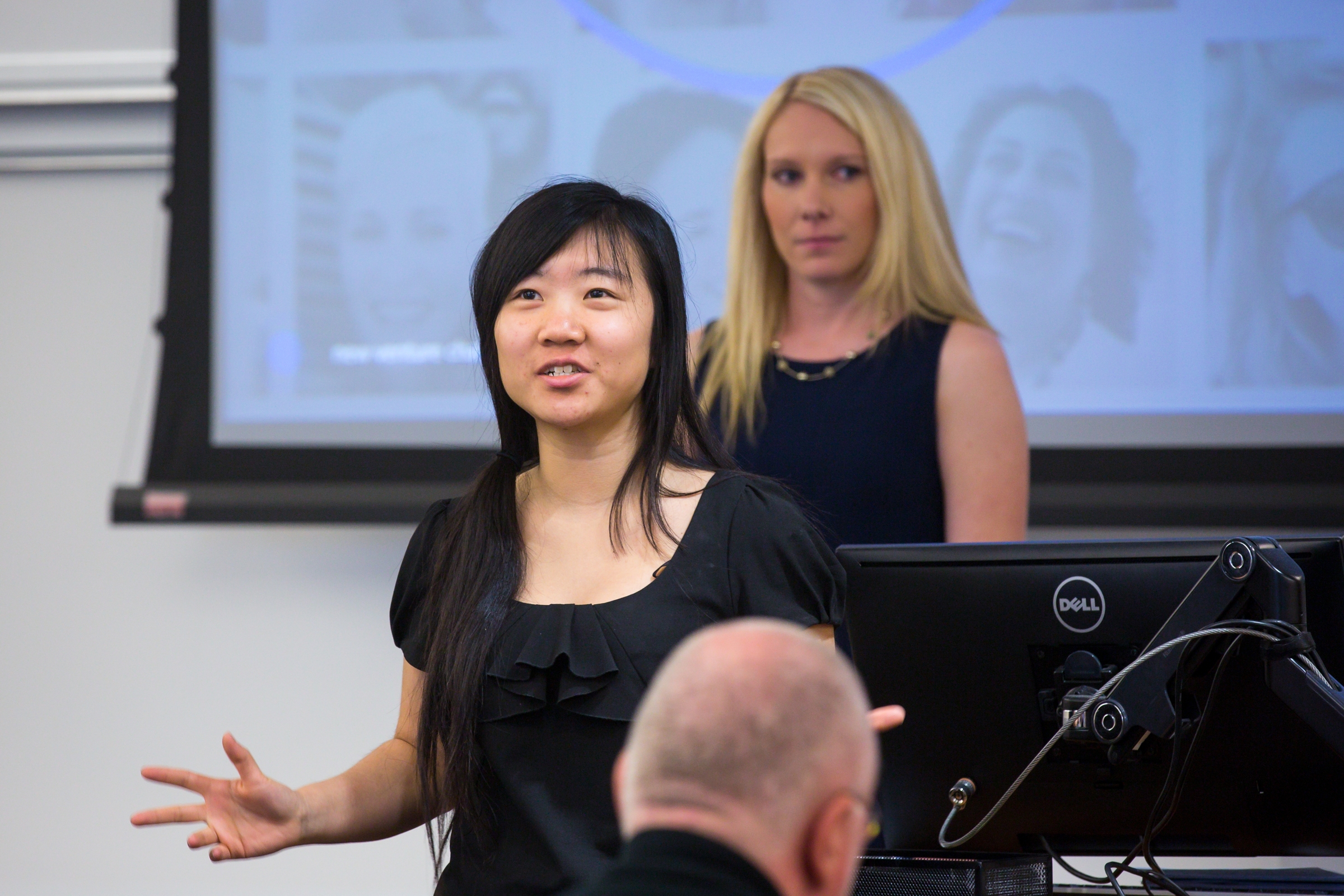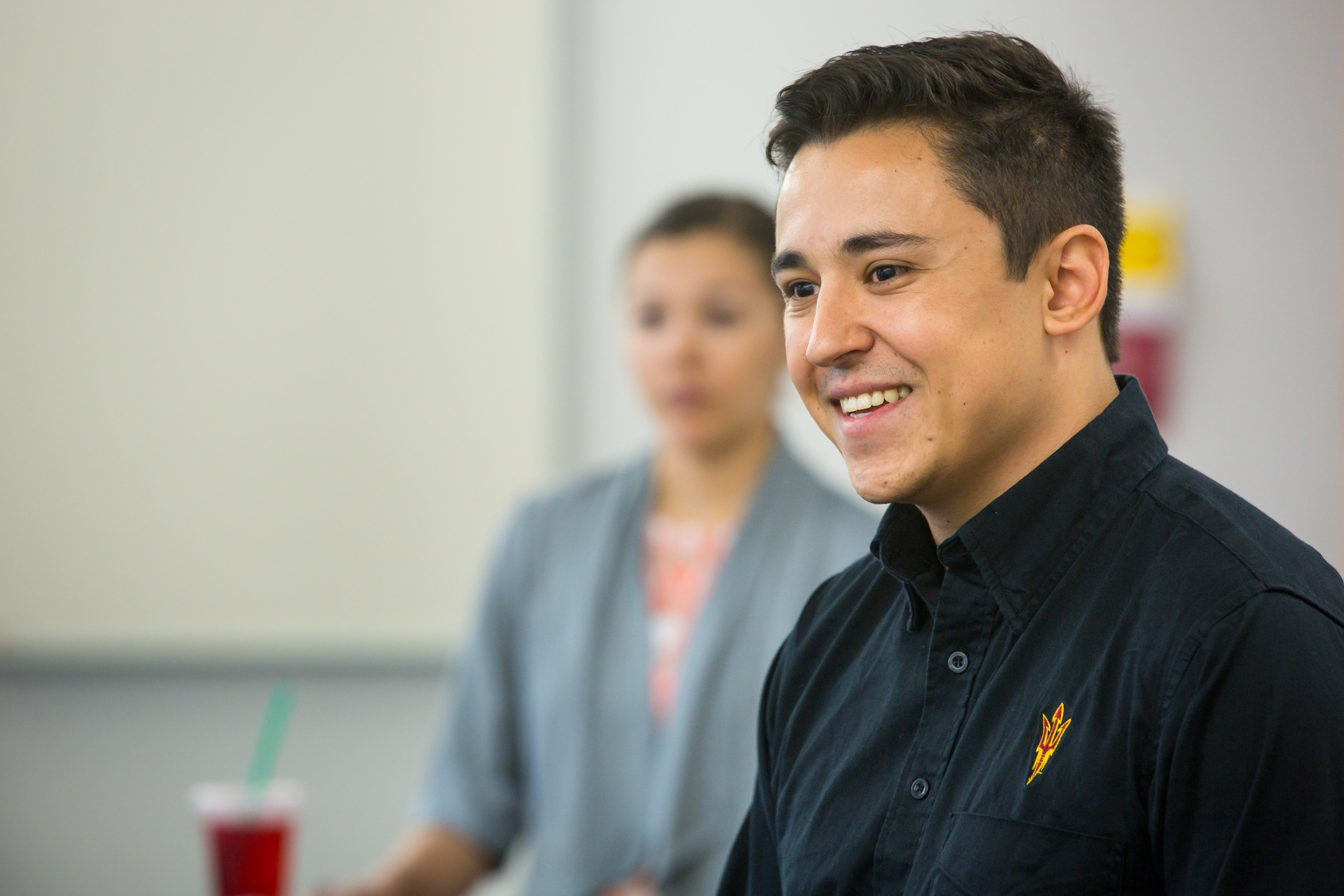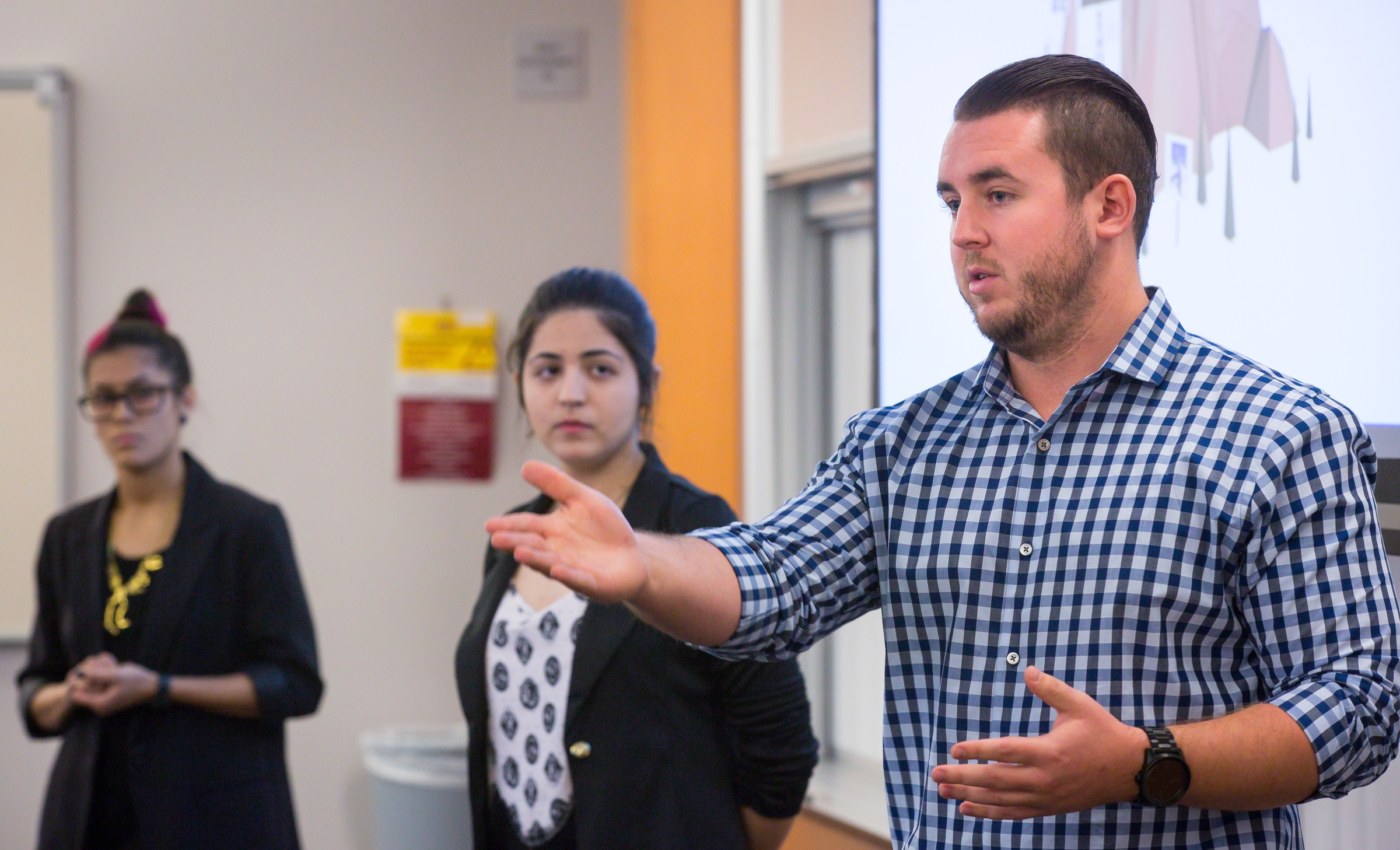A nanoparticle-coating systems company was the biggest winner in the New Venture Challenge entrepreneurship competition at Arizona State University.
LN Tech won $45,000 in cash at the competition.
“I’m completely shocked,” said Peter Firth, LN Tech’s co-founder (pictured above), who gave the winning pitch. ”We came in, and I had no idea what I was doing. I was just excited to be in the finals.”
Firth, who received his bachelor’s and master’s degrees from ASU, is partners with Zachary Holman, an assistant professor in the School of Electrical, Computing and Energy Engineering The School of Electrical, Computing and Energy Engineering is part of the Ira A. Fulton Schools of Engineering.at ASU.
“I guess we’re really going to do this now,” Firth said of the one-day windfall in investment money.
LN Tech was one of four finalists in the inaugural New Venture Challenge, and everyone won something. The other finalist companies were LetsChat, a mobile app that connects native English speakers with learners of English in China; HELOS, which has developed a hands-free snowboard binding; and Desert Bee, which created a data-management platform for preschools.
The competition was for graduate students, and each team had to include at least one ASU student who owns at least 10 percent of the company, according to Sidnee Peck, director of the Center for Entrepreneurship in the W. P. Carey School of Business, which held the program in conjunction with the Ira A. Fulton Schools of Engineering.
In January, student-driven companies applied to take a half-semester class taught by Scott Wald, a software entrepreneur who earned a master’s of business administration from ASU. Eight teams were selected to take the class, and they worked with Wald and other mentors on specific areas of entrepreneurship, such as financial forecasting and story pitching. Then the finalists were selected to compete on May 6.
The panel of judges, all entrepreneurial experts, distributed $80,000 in cash awards and $63,500 in donated services such as design consulting and legal assistance. The funding came from a private donor, who has committed to two more New Venture Challenge competitions.
Peck said that ASU will get equity in the winning companies.
“So if they do well, we will do well,” she said, adding that any profits will be re-invested into the competition.
Here’s a look at the four New Venture Challenge teams and their innovative products.
LN Tech
Product: A delivery system for nanoparticle coatings, similar to an aerosol spray nozzle.
Pitch: Firth and Holman have been developing their product since 2013.
Peter Firth reacts upon hearing that the company he co-founded, LN Tech, won the New Venture Challenge entrepreneurial competition. Photos by Charlie Leight/ASU Now
Firth said that the nanoparticle-coating business is a $14 billion market that people interact with daily.
“If you have a smartphone, have you noticed that your fingerprints don’t adhere to the glass surface like they do to the windows in your home? That’s because your phone is coated with thin layer of nanoparticles that repel the oils from your skin,” Firth said.
LN Tech has created a way to precisely apply nanoparticles to any surface. Firth said the technology is especially applicable to the new LCD display devices, but the company also works on products such as antibiotic bandages and energy-efficient window coatings.
Firth said that the display industry will result in 225 million square feet of coating in 10 years.
“That’s a lot of capacity we could get hold of. If we could grab just one half of one percent of that market, that’s $1.8 million per month in revenue for our company,” Firth said.
Prize: $45,000 in cash, plus legal services and accounting consulting.
LetsChat
Product: A mobile application that connects native English speakers with people in China who are seeking to learn English.
The pitch: Chang Liu arrived from China to study marketing at ASU last summer when she realized that despite years of learning English, she could not speak it well.
Chang Liu, an ASU student from China, had the idea for the LetsChat app when she struggled with English upon first arriving in the United States. Photo by Charlie Leight/ASU Now
“After staying at ASU for one semester, my English improved very much, which made me realize that the best way to learn a language is to converse with native speakers,” she said.
Liu created the idea of an English-language learning application and partnered with Megan Kirk and Elizabeth Oviedo, who both earned their masters of business administration degrees from the W. P. Carey School Business this month. In February, the team won the Sun Devil Igniter Challenge and a $50,000 prize.
LetsChat will recruit a pool of native English speakers, who will upload video profiles to the app. People in China can choose a native English speaker and begin a conversation via text, voice or video. Users will pay an hourly fee to communicate one-on-one or in groups. LetsChat will take a 20 percent commission, and the English speaker will keep the rest. The team estimates that speakers can earn nearly $60,000 a year if they work 40 hours a week.
The platform will differ from its competitors because it focuses on American-style English, includes a translation function and offers software that allows learners to track their accent compared with a native English speaker's.
LetsChat has partnered with the ASU chapter of TESOL (Teachers of English to Speakers of Other Languages), which will allow students to use the LetsChat app to fulfill their 150-hour internship requirement.
The team expects to begin testing the app this summer with plans to launch at the end of 2016.
The prize: $25,000 in cash plus work space, consulting and networking services.
Desert Bee
Product: A digital platform that allows preschool teachers to efficiently communicate with parents and allows parents to see developmental data about their children.
The pitch: Siblings Charlene and Robert Bruce are part of a team that developed a student information system platform in 2015 that can be accessed on a tablet by teachers and via a smartphone application by parents. Robert Bruce earned a master’s degree this month from ASU. He also works as a systems analyst at ASU.
Robert Bruce and his sister, Charlene Bruce, are on the team that created the Desert Bee information platform for preschools. Photo by Charlie Leight/ASU Now.
Typically, preschool teachers will record information several times a day for every child on diaper changes, naps and feedings. Those reports go home with parents.
“All of this is a great waste of time and paper,” said Charlene Bruce, a coach for preschool teachers. “Desert Bee is going to put those pieces together and create a platform that will help parents feel part of classroom experience and help teachers spend more time teaching.”
The website would be free for parents. The mobile app would cost parents $4.99, and a $6.99 premium version would provide an individualized database with at-home activities to boost specific skills for each child. Teachers can post video and photos, and administrators can track attendance, tuition payments and payroll. Desert Bee also will offer in-app purchases from vendors such as Scholastic and Amazon. Schools would pay $1,800 a year for the service.
Desert Bee will pilot the app through the ASU Mary Lou Fulton Teachers College Preschool.
The prize: $10,000 cash, plus product-development consulting and pitch coaching.
HELOS
Product: HELOS Heel Locking System is a step-in snowboard binding that eliminates the need to bend over.
Pitch: The HELOS binding started as an ASU engineering capstone project for the team, which won the Spark Tank entrepreneurial competition in 2015.
J.J. McNeil, right, along with Leila Jawhar and Rebecca Christensen, left, created the HELOS snowboard binding as part of an engineering capstone project. Photo by Charlie Leight/ASU Now
Existing hands-free bindings require specific equipment. The patented HELOS technology works with all boot and snowboard types.
“I cannot stand wasting time at the top of the lift strapping myself on the board,” said Rebecca Christensen, project manager for the team who has a bachelor’s degree in mechanical engineering and a master’s degree in management, both from ASU. “Lift tickets aren’t cheap, and I want to spend every minute I can on the slope.”
The team is looking to launch the product in winter 2017 after working on a 3-D-printed prototype and testing this year. HELOS is now recruiting beta testers to give feedback and will eventually sponsor snowboarding events as part of its marketing plan.
The prize: design services consulting.
Top photo: Peter Firth pitches the company he co-founded, LN Tech, at the New Venture Challenge entrepreneurial competition. Photo by Charlie Leight/ASU Now
More Science and technology
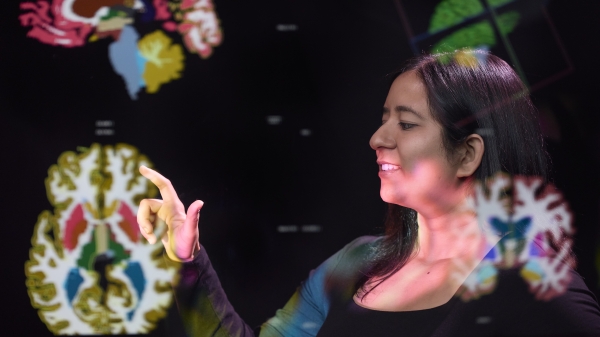
New NIH-funded program will train ASU students for the future of AI-powered medicine
The medical sector is increasingly exploring the use of artificial intelligence, or AI, to make health care more affordable and to improve patient outcomes, but new programs are needed to train…

Cosmic clues: Metal-poor regions unveil potential method for galaxy growth
For decades, astronomers have analyzed data from space and ground telescopes to learn more about galaxies in the universe. Understanding how galaxies behave in metal-poor regions could play a crucial…

Indigenous geneticists build unprecedented research community at ASU
When Krystal Tsosie (Diné) was an undergraduate at Arizona State University, there were no Indigenous faculty she could look to in any science department. In 2022, after getting her PhD in genomics…
